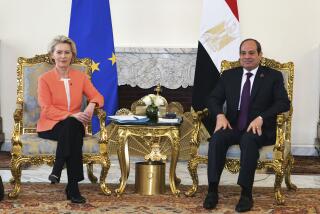Egypt Welcomed Back to Key Arab World Role
- Share via
KUWAIT — After eight years of isolation for signing a peace treaty with Israel, Egypt is being welcomed back to a position of prominence in the Arab world, according to Arab officials and Western diplomats.
The officials said that Egypt’s standing marked a turning point with the arrival in Kuwait this weekend of Egyptian President Hosni Mubarak to lead his country’s delegation to a summit conference of Islamic leaders, which opens today.
The meeting itself is expected to provide little new in relations among Muslim nations, but for Mubarak, participation in the meeting and in corridor encounters with other Arab statesmen signifies the rehabilitation of Egypt in the eyes of the Arab world after a rupture that began with the signing in March, 1979, of a peace treaty between Israel and Egypt.
Mubarak has briefly encountered other Arab leaders at such international gatherings as the Nonaligned Movement conference last year in Zimbabwe, but he has not participated as a full-fledged member of any meeting of Arab leaders.
May Restore Relations
Egyptian officials believe the meeting here of the Organization of the Islamic Conference will lead at least six Arab states to restore formal relations with Cairo, including renewal of official economic assistance to Egypt’s financially beleaguered government.
At present, only Jordan and Djibouti have renewed ties with Cairo. Oman, Somalia and Sudan maintained relations after the peace pact was signed by the late Anwar Sadat and former Israeli Prime Minister Menachem Begin.
Now, Morocco, whose King Hassan II met with Israeli Prime Minister Shimon Peres last year, as well as Kuwait, Algeria and Iraq, are expected to be among nations sending envoys again to the Egyptian capital.
In addition, the Egyptians, who were historically leaders of the Arab world in such realms as literature and cinema as well as politics, are expected to resume leadership roles in many fields, according to officials.
Counterbalance for Assad
It has long been a major hope of U.S. policy-makers that a moderate Egypt would be allowed back into the Arab fold to challenge Syria’s radical leader, Hafez Assad, for leadership of the region.
Assad has announced that he will attend the Kuwait summit, and if he does, it would be the scene of his first formal meeting with Mubarak since the latter became Egyptian president.
Arab officials and Western diplomats said they believe Mubarak’s announced presence in Kuwait played a role in Assad’s decision to attend the talks, based on concern that the Egyptian might steal Assad’s thunder. Kuwait also reportedly offered Syria substantial financial assistance to attend.
One Egyptian official said a major victory was achieved by Egypt in a preliminary meeting Saturday, where Syrian Foreign Minister Farouk Shareh described the Egyptians as the “prostitutes of the Arab world” and condemned the Mubarak regime.
The victory came when the other foreign ministers backed Egypt after Syria had proposed reversing a 1984 decision to restore Egypt to membership in the Islamic conference.
‘No in a Very Loud Voice’
“They’ve had enough of the Syrians and the Libyans, especially on matters of blackmail,” one Egyptian journalist said. “For the first time, here they have said no in a very loud voice.”
Assad was apparently feeling so vulnerable on the Egyptian question that he stressed to a Kuwaiti newspaper interviewer that his differences were with Egyptian policy rather than Mubarak.
Assad then described the Egyptian leader as a “good man” but did so in a manner that Egyptians usually reserve for servants.
In part, the Arab states are merely recognizing the reality of their relations with Egypt, which, except for Libya and Syria, have been continuing at an unofficial level.
According to Egyptian officials, another reason for the conciliatory mood is the fear that Persian Gulf Arab states have about Iran’s intentions in the war with Iraq, now in its seventh year.
Egypt’s Military Appreciated
Such weakly defended countries as Kuwait and Saudi Arabia have been holding talks for the last four to five months with the Egyptian government on possible Egyptian military deployment in the event that Iran threatens any of the gulf states.
According to one Egyptian official, the Egyptians have already sent a number of advisers to Saudi Arabia, Kuwait, the United Arab Emirates and Iraq to advise on military and security concerns.
With a 320,000-man, American-equipped army, Egypt is regarded by the gulf states as the only country that can offer a credible defense against Iran, according to Western diplomats.
Recent Iranian advances against Iraq near Basra have sharply escalated fears in the gulf, which in turn has accelerated Egypt’s rehabilitation.
Mubarak met for more than an hour Saturday night with the Kuwaiti emir, Sheik Jabbar al Ahmed al Sabah, according to Egyptian officials.
Economic Aid Discussed
The main focus of the talks, the officials said, was not the Islamic conference, but economic assistance from Kuwait to Egypt, which was officially suspended in 1979 after the break in relations.
Egypt is seeking Arab help to retire $5 billion in debts to the United States for military equipment.
The gulf countries are discussing a possible assumption of the debt by a consortium of Arab banks, which would then be repaid by Egypt on favorable terms, according to Egyptian officials.
Mubarak’s arrival here Saturday was broadcast to the gulf for more then an hour on live television and again during the evening news.
The Egyptian’s arrival caused some officially sponsored joy. One letter writer in Sunday’s Arab Times wrote that Mubarak “is visiting us through the gate of Islam, but in our hearts it is also the gate of Arabs.”
More to Read
Sign up for Essential California
The most important California stories and recommendations in your inbox every morning.
You may occasionally receive promotional content from the Los Angeles Times.













